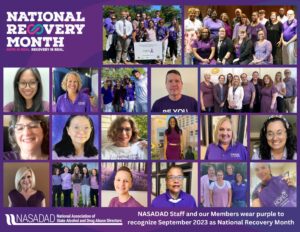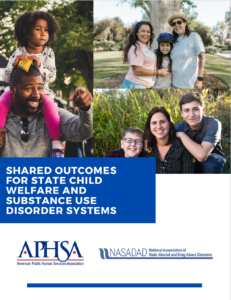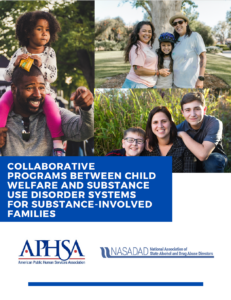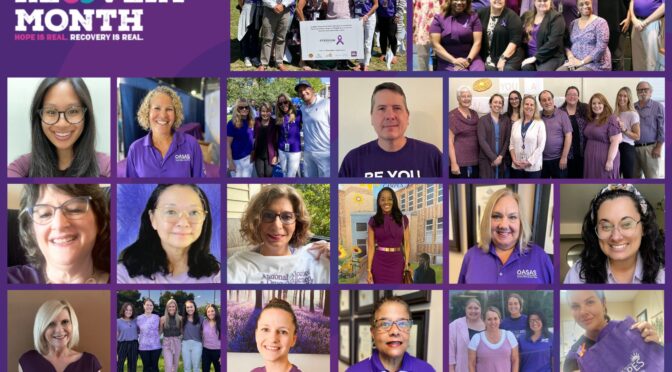All posts by Lacy Adams
House Dear Colleague on FY 2025 SUPTRS Block Grant
Policy Brief Highlights Disasters and Substance Use – Implications for Changes to the Federal Robert T. Stafford Act (Updated)
Today, NASADAD is pleased to release an updated policy brief that examines the impact of disasters on substance use programs and services, highlighting the benefit of changes to Federal Emergency Management Agency’s (FEMA) Crisis Counseling Assistance and Training Program (CCP). The brief, titled “Disasters and Substance Use: Implications for Changes to the Federal Robert T. Stafford Act,” provides key insights into the challenges faced by substance use programs in the aftermath of disasters and opportunities for legislative action.
The brief cites studies showing that traumatic events can lead to an increase in substance use and place a strain on existing services. For example, the terrorist attacks of September 11th increased the intensity and need for substance use prevention and treatment services in New York State. The brief emphasizes the importance of coordination with State alcohol and drug agencies to ensure a comprehensive and effective response during disasters.
One of the key recommendations NASADAD offers in the brief is to amend Section 416 of the Robert T. Stafford Act to explicitly include substance use disorders in the portion of the statute that governs the CCP. The proposed legislation, known as the Addressing Addiction After Disasters Act (H.R. 5623 or the AAAD Act), aims to ensure that individuals struggling with substance use disorders receive the support they need in the aftermath of disasters. The legislation is led by Representatives Becca Balint (D-VT-at large), Doug LaMalfa (R-CA), and Jill Tokuda (D-HI). The AAAD Act would help bolster intentional awareness, planning, and action regarding issues specific to substance use disorders within the confines of the short-term approach of the CCP.
NASADAD Recognizes September as Recovery Month
National Recovery Month is held each September to raise awareness and share the message that people do recover from substance use disorders. Recovery month has embraced the permanent theme of “Every person. Every family. Every Community.” Through this message, Recovery Month seeks to educate the public, stakeholders, and communities about addiction as a disease by sharing resources that elevate recovery practices and the effectiveness of treatment.
NASADAD’s members serve as the lead agency in each State or jurisdiction responsible for managing federal funds dedicated to addressing substance use prevention, treatment, and recovery. This month, our Members wear purple to celebrate recovery and promote awareness of substance use disorder issues. NASADAD is grateful for the work all of our members do in their States and jurisdictions to support recovery every day of the year.

Follow NASADAD on LinkedIn for updates from the Association.
State Opioid Treatment Authority (SOTA) Role Explained
As the nation continues to experience record high tragic deaths from opioid overdose, access to high quality treatment using medications for opioid use disorder (MOUD) is critical. The State Opioid Treatment Authority (SOTA) plays a key role in providing oversight and support to the opioid treatment programs (OTPs) that use methadone and other Food and Drug Administration-approved medications and provide counseling and other services to individuals with opioid use disorder (OUD). NASADAD worked with SOTAs across the nation to develop a document that summarizes the core and common duties and responsibilities of their role, with input from Substance Abuse and Mental Health Services Administration (SAMHSA) and the NASADAD Board of Directors. The document below provides a summary of this document.
NASADAD/APHSA Release Publications on Improving Collaboration Between the Child Welfare and Alcohol and Other Drug Systems
Research has shown that if left untreated, parental substance use disorders (SUD) can have a negative impact on the entire family. According to a Substance Abuse and Mental Health Services Administration (SAMHSA) study published in 2017, approximately 1 in 8 children in the United States lived with a parent who had a past year SUD. While many children who are exposed to parental substance misuse will not experience maltreatment, they are at higher risk of maltreatment and child welfare involvement and are twice as likely to develop an SUD themselves. Intentional planning and coordination between state alcohol and other drug (AOD) and child welfare agencies are essential to prevent the negative consequences that SUD can have on families and prevent children from entering the foster care system.
To strengthen the collaboration and relationship between these agencies, the American Public Human Services Association (APHSA) and the National Association of State Alcohol and Drug Abuse Directors (NASADAD) launched a workgroup of state child welfare and AOD leaders. Through a series of meetings conducted throughout 2022, agency leadership worked together to understand the barriers and opportunities to align systems and improve services for shared populations. Those conversations initiated the development of foundational resources for both agencies that outlined shared outcome measures and examples of existing collaborations between the two systems. Guided by the workgroup, APHSA and NASADAD worked together to create two resources for AOD and child welfare agencies, as well as other organizations that work with child welfare-involved families impacted by substance use:
 Shared Outcomes for Child Welfare and Substance Use Disorder Systems– This document aims to provide child welfare and AOD systems with guidance to start and deepen conversations by enabling state agencies to jointly assess the services offered to child welfare-involved families impacted by substance use.
Shared Outcomes for Child Welfare and Substance Use Disorder Systems– This document aims to provide child welfare and AOD systems with guidance to start and deepen conversations by enabling state agencies to jointly assess the services offered to child welfare-involved families impacted by substance use.
 Collaborative Programs Between Child Welfare and Substance Use Disorder Systems – This document provides state agencies with existing models of collaboration between child welfare and AOD agencies along with court systems.
Collaborative Programs Between Child Welfare and Substance Use Disorder Systems – This document provides state agencies with existing models of collaboration between child welfare and AOD agencies along with court systems.
Please direct any questions to Caroline Halsted (chalsted@nasadad.org).
